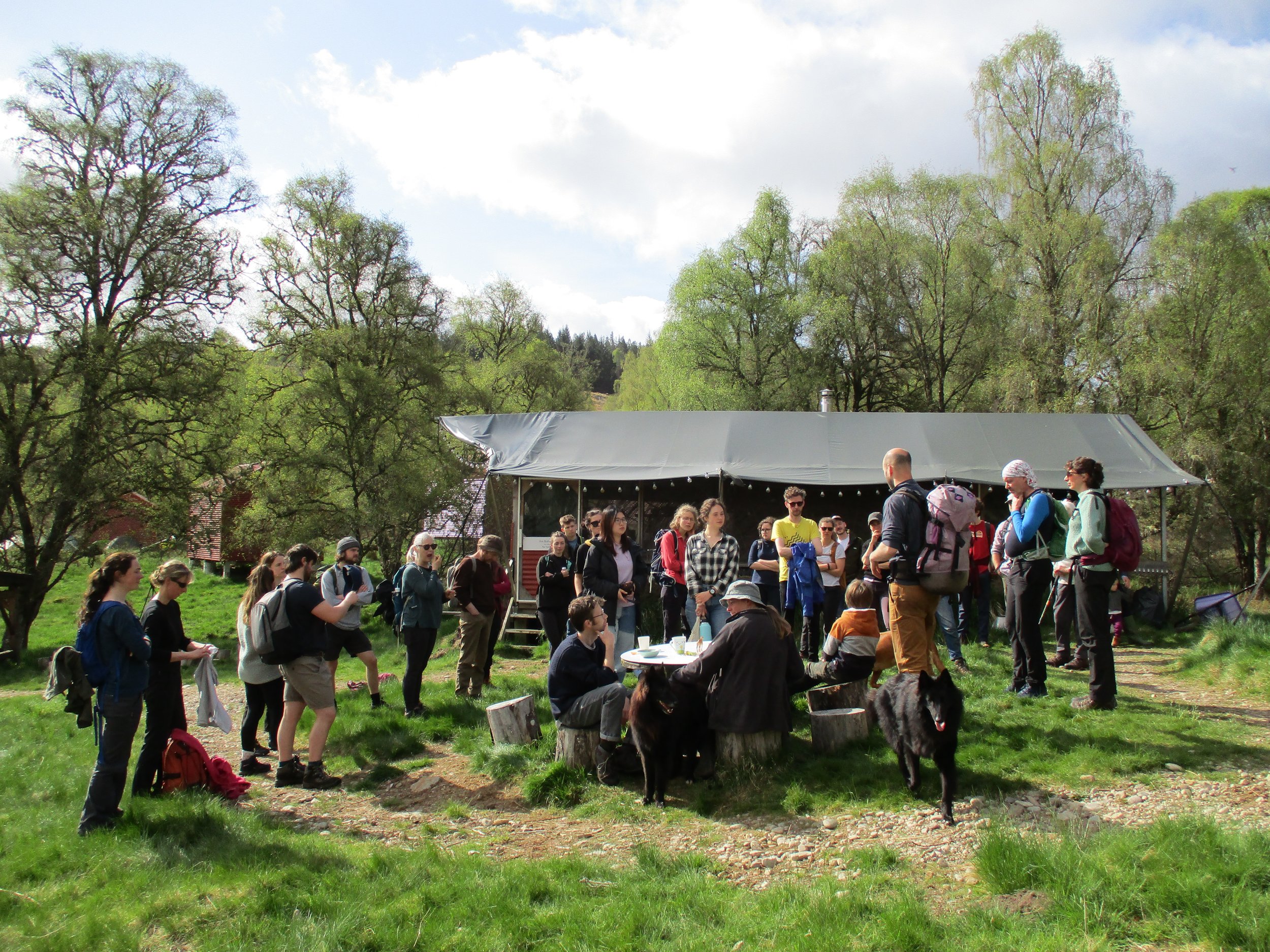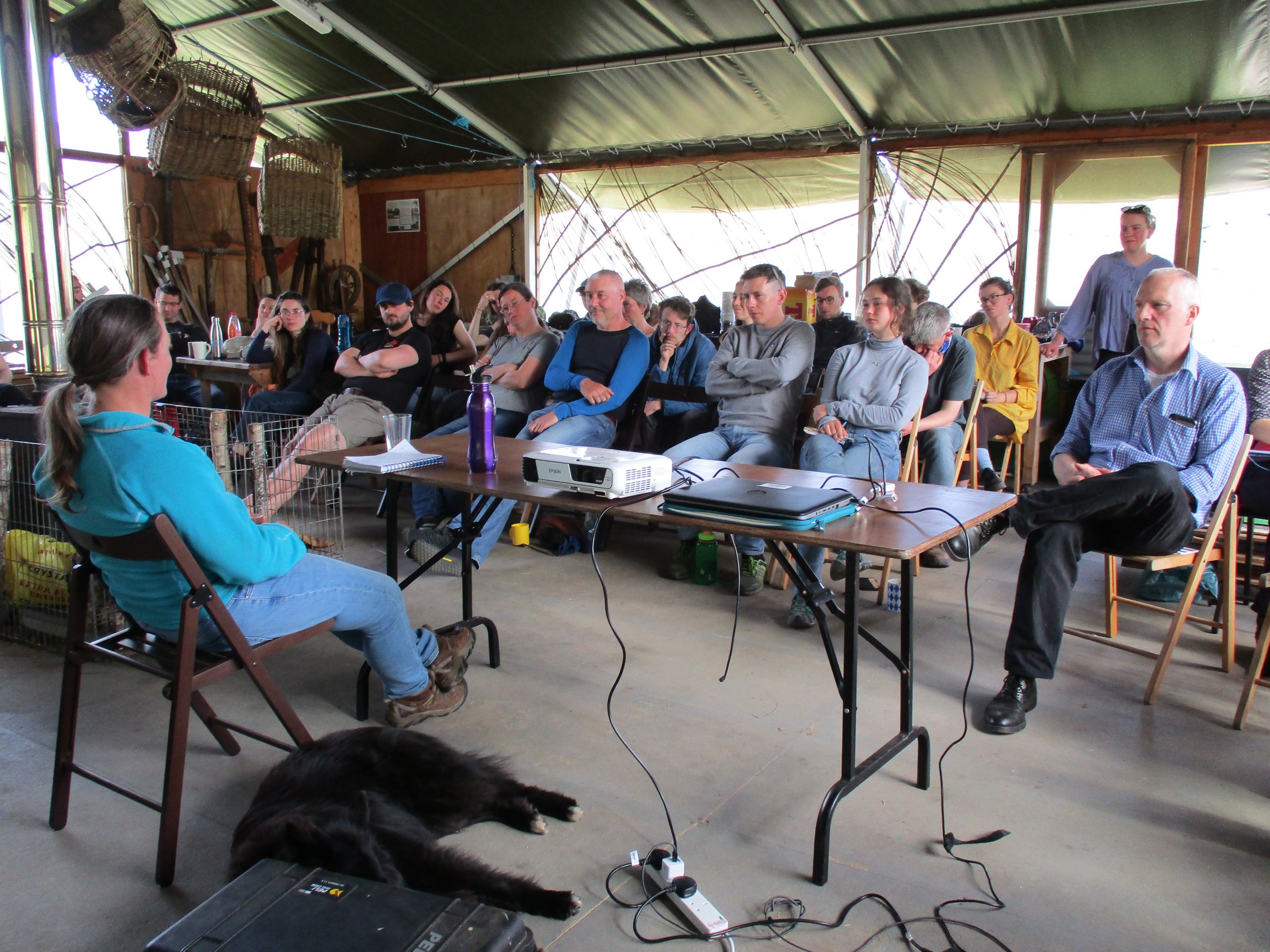ECOLOGY AND LAND REFORM WEEKEND AT THE SHIELING PROJECT
On 7th May, postgraduate students and academics gathered at the Shieling Project (Struy, Inverness-shire) to discuss ecology and land reform, and the past and present struggles that have marked these issues in Scotland. Seven speakers took us on a journey from the early Clearances to contemporary debates around rewilding, ownership and depopulation. The location reflected many of these issues, as we sat in Glen Strathfarrar, which had seen not one, but two communities cleared from the land by the Lovat family in the 1800s. The glen now provides a site for the Shieling Project, where children and adults come to learn about Gaelic culture and heritage, developing new skills and gaining independence along the way.
On a sunny Saturday afternoon, we gathered in An Talla (the Hall), to hear from Andrew Mackillop (Senior Lecturer in Scottish History at University of Glasgow) on how we need to challenge previous conceptions of tenants passively leaving Highland estates at the landlords’ behest. As opposed to focussing on those who emigrated, Andrew encouraged us to consider what happens to those who stayed. He has found evidence of estates’ tenants intimidating landlords with the threat of emigration and how this would dent their income, and similar instances of tenants using rent strikes to throw landlords’ finances into jeopardy. Although this was in the 1760s, and many would go on to be cleared from estates, these events hold lessons for landlord resistance today. Finding landlords’ aims, turning them against them and then proposing a better alternative could form the basis of strategic resistance in the struggle for land reform argues Mackillop.
Elizabeth Ritchie (Senior Lecturer in Scottish History at University of the Highlands and Islands) and DJ McLeod then took us to west Lewis and into their lockdown activity of naming landscapes and blackhouse ruins around the village of Arnol. Elizabeth and DJ neatly demonstrated the insider-outsider dialectic that researchers must navigate when exploring Gaelic culture. Elizabeth is a historian who grew up in Arnol and, with her DJ partner, took us on a journey attempting to name and understand the landscape and village she found herself in, and how this journey of naming uncovered hidden stories and land use changes. The naming proved enlightening but elusive, and Elizabeth emphasised the importance of framing and context when going about this task – what something (a shieling, a rock or a house) might be called depends on who you ask!
Our final talk on Saturday, from Chrissie Gillies (crofter and Gaelic Development Officer at Community Land Scotland), was on the decline of Gaelic in Raasay. Chrissy explained how the loss of Gaelic could be linked to economic, political and social factors, such as education increasingly taken in English, and an association that English was the language of getting on and getting out, while Gaelic belonged to the past. Chrissie has worked to become a Gaelic speaker as an adult, and to encourage others that there are many opportunities available through learning Gaelic. She pointed to other indigenous groups in New Zealand and North and Latin America who have worked to preserve and promote their native languages. In summary, everyone should get on Duolingo and be part of the movement to preserve and spread Gaelic today!
In the evening, there was pizza making followed by storytelling and singing around the campfire, and on Sunday morning we gathered back in An Talla (with a few sore heads) to hear from Magnus Davidson (Research Associate at University of the Highlands and Islands). Magnus started off by outlining that land reform is a social justice issue encompassing both land ownership and land management. As a process, land reform has come a long way in Scotland, but we can still do better. In the past few years, demand for Highland estates has risen with the growing popularity of ‘rewilding’ as project for the rich and sometimes famous. However, this ‘rewilding’ endeavour is a direct contradiction to the Highlands and Islands as a region, perpetuating the myth of wild rural landscapes empty of people. Magnus related this to ‘shifting baseline syndrome’, a term usually used by ecologists to describe how each generation interprets the biodiversity they see as the norm, while in fact previous generations would have seen a more abundant biodiversity. In the same way, people growing up in or visiting the Highlands and Islands now may think the empty landscape is how it has always been, when in fact they are looking at a landscape that has been systematically depopulated. Magnus also described the challenge of engaging ecologists concerned with conservation and rewilding of the socio-cultural aspects of a landscape and the importance of the crofting community deciding how to interact with the rewilding community, to ensure there is a conversation around degraded landscapes that includes the people living there. To guarantee land reform continues, Magnus argued there needs to be local devolution of land reform processes, granting greater autonomy to those who live in areas most affected by inequitable patterns of land use and ownership.
Helen O’Keefe, Young Crofter of the Year 2021 was next, and spoke powerfully on how it is impossible to separate land reform from reform of all systems that are structured to benefit those with power and money. She also emphasised how crofting is an important tool for local land management, as well as describing how she navigated life as an ‘incomer’ in Elphin, Sutherland and made the effort to learn about and appreciate the local culture. Similar themes were reflected upon by Col Gordon (seed researcher and baker) in his talk, which centred around the similarities of the Gàidhealtachd to other indigenous groups around the world. Thuath and Dualchas, representing both the territory and the people of the territory, and culture and heritage, can be keystone ideas as we look at how humans are a part of reconstituting a landscape. Through the revival of old foods, seeds, language and culture, Col encouraged us to recognise how heritage can play an important role in our ecological future.
Bobby Macauley (Research Associate at University of Highlands and Islands) gave the last talk and called for a consolidation of research on land reform, and a consideration of how communities can be active participants in research going forward – moving beyond academia’s ivory tower to ask why we do research, and for who. Land reform relates to many academic disciplines, and Bobby has started an initative, Community Landownership Academic Network (CLAN), to improve coordination and dissemination of research relating to land reform. You can follow CLAN on Twitter for updates. A massive thank you must go to Ryan Dziadowiec and Gemma Smith who organised such a brilliant event, bringing together so many passionate researchers and speakers.
The event was funded by Bòrd na Gàidhlig, the GU PGR Community Building and Public Engagement Fund, and the Centre for Scottish and Celtic Studies
SEDA Land will be publishing a series of blogs on all issues relating to land use in Scotland. If you’re interested in contributing, please email land@seda.uk.net


